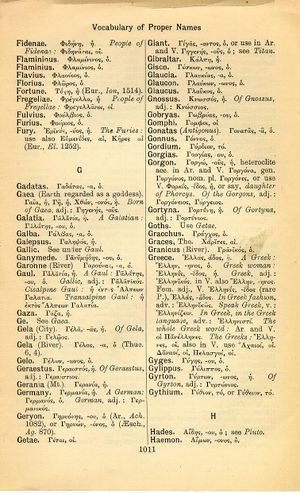Fidenae
Νόμιζε γήμας δοῦλος εἶναι διὰ βίου → Uxore ducta vivere ut servus para → Nimm eine Frau und sei ihr Knecht ein Leben lang
English > Greek (Woodhouse)
Φιδήνη, ἡ.
People of Fidenae: Φιδηνᾶναι, οἱ.
Latin > English (Lewis & Short)
Fīdēnae: ārum (sing. Fīdēna, ae, Sil. 15, 91; Tac. A. 4, 62. Fĭdēna with the
I i short, Verg. A. 6, 773), f., a very ancient town of Latium, on the left bank of the Tiber, five miles from Rome, now Castel Giubileo, Liv. 1, 27; 2, 19; 4, 17; 22; 33 sq.; Cic. Agr. 2, 35, 96; id. Phil. 9, 1, 4; Suet. Tib. 40; id. Calig. 31; Tac. H. 3, 79; Prop. 4 (5), 1, 36; Hor. Ep. 1, 11, 8; Juv. 6, 57 al.; cf. Bormann, Alt-Latin. Chorographie, p. 239 sq.—
II Deriv.: Fīdēnas, ātis, adj., of or belonging to Fidenae: ager, Plin. 3, 5, 9, § 54: bellum, Liv. 1, 15.—As a surname: L. Sergius Fidenas, Liv. 4, 17; 25.—In plur. subst.: Fīdēnātes, ium, m., the inhabitants of Fidenae, Fidenates, Liv. 1, 15; 4, 17 sq.
Latin > German (Georges)
Fīdēnae, ārum, f. u. Fīdēna, ae, f., ein vormals blühendes, zu Horaz' Zeiten zur Unbedeutenheit herabgesunkenes, aber später wieder stark bevölkertes Munizipium im Sabinischen am Ende des Tibertals zwischen Rom u. Veji, j. (auch) nach Abeken Mittelital. S. 97 f.) Ruinen bei Castro Giubileo, Form -ae, Liv. 1, 14, 5 sqq. Cic. de lege agr. 2, 96. Hor. ep. 1, 11, 8: Form -a, Verg. Aen. 6, 773 (wo i kurz). Plin. 16, 11. Tac. ann. 4, 62. – Dav. Fīdēnās, ätis, fidenatisch, bellum, Liv.: tofus, Plin.: lapidicinae, Vitr. – Plur. subst., Fīdēnātēs, ium, m., die Einw. von Fidenä, die Fidenaten, Liv. u.a.

